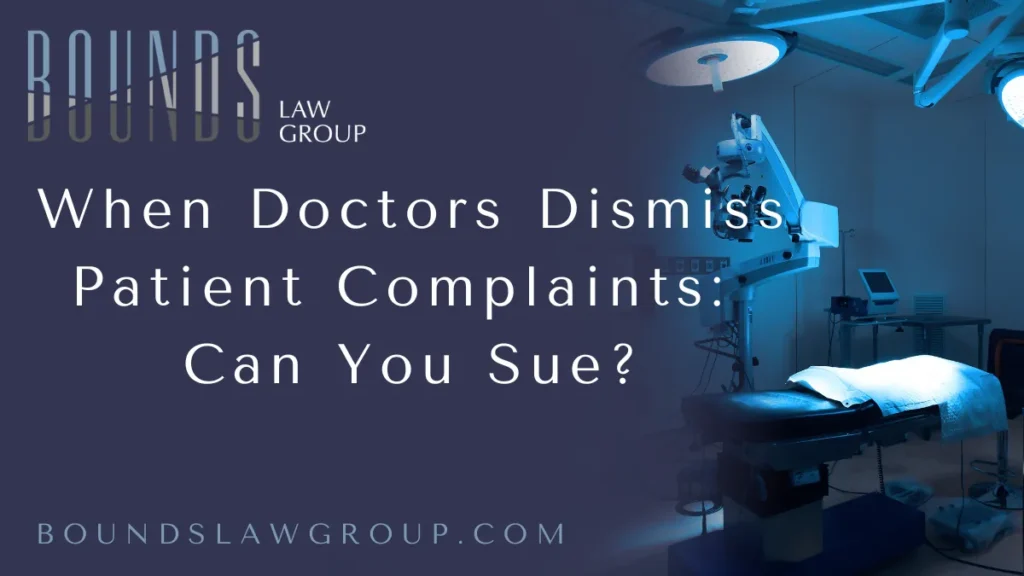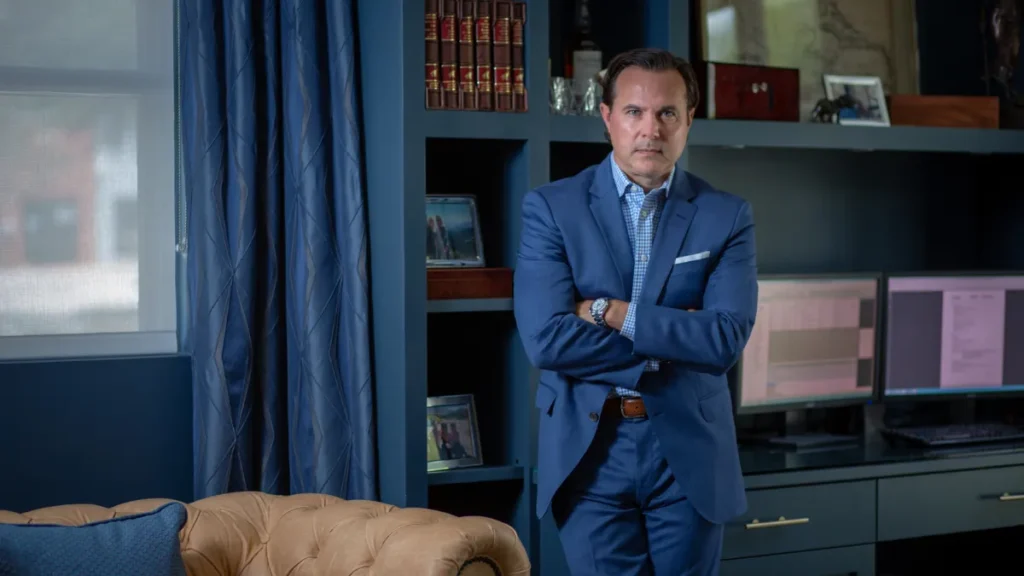
What Is a Failure to Listen to Patients Lawsuit?
A failure to listen to patients lawsuit is a type of medical malpractice claim that arises when a healthcare provider dismisses, minimizes, or outright ignores a patient's complaints or symptoms, leading to injury or a worsened condition. These lawsuits are based on the fundamental premise that doctors have a duty of care—and when they breach that duty by failing to engage with patient-reported symptoms, the consequences can be catastrophic.
Contact us now at 877-644-5122 or complete the free case evaluation form for expert legal assistance.
Common Examples of Failure to Listen in Medical Practice
- Ignoring chest pain or assuming it’s anxiety
- Disregarding reports of chronic or worsening pain
- Downplaying unusual symptoms in women or minorities
- Failing to refer patients to a specialist
- Refusing further testing despite patient insistence
In each of these cases, the patient’s voice is silenced, often resulting in missed diagnoses such as cancer, heart disease, infections, or neurological disorders.
Can You File a Lawsuit If a Doctor Ignored Your Symptoms?
Yes. If a doctor’s refusal to take your complaints seriously led to measurable harm, you may be eligible to file a failure to listen to patients lawsuit. To succeed, you’ll need to demonstrate:
- A doctor-patient relationship existed
- The physician breached their duty of care by failing to investigate your symptoms
- That breach caused injury, illness, or death
- You suffered damages such as additional medical expenses, pain, lost wages, or long-term disability
Medical malpractice cases are complex. That’s why Bounds Law Group offers a free case evaluation form to assess the strength of your potential claim.

How Failure to Listen Leads to Medical Malpractice
Physicians are trained to interpret data and symptoms—but when they ignore a patient's lived experience, the consequences can be life-altering. Common injuries and outcomes resulting from failure to listen include:
- Advanced cancer due to delayed diagnosis
- Heart attacks or strokes mistaken for anxiety
- Unnecessary surgeries when less invasive options were overlooked
- Misdiagnosed autoimmune disorders
- Birth injuries from ignored maternal concerns
Doctors often dismiss symptoms due to implicit bias, time constraints, or overconfidence in their own expertise. But patients have rights, and physicians have legal obligations to listen, investigate, and respond appropriately.
Legal Challenges in Proving a Failure to Listen to Patients Lawsuit
One of the biggest hurdles in these cases is proving negligence, especially when no “objective” test was ignored but rather a patient’s words were dismissed. This is why having a seasoned legal team matters.
Our attorneys at Bounds Law Group work closely with:
- Medical experts who can validate the standard of care
- Specialists in the relevant medical field to testify
- Witnesses such as nurses, family members, or other providers
- Your medical records and documentation of ignored symptoms
With these tools, we build a powerful case to prove that your voice was silenced—and that it caused harm.
Who Is Most at Risk When Doctors Don't Listen?
Sadly, certain populations are more vulnerable to being dismissed in clinical settings. These include:
- Women, especially reporting pain or cardiac symptoms
- People of color, who face disparities in diagnostic testing
- Elderly patients, often ignored or written off
- Disabled individuals, whose symptoms are attributed to pre-existing conditions
- Non-native English speakers, due to communication barriers
At Bounds Law Group, we believe everyone deserves to be heard and treated with respect—and we fight to ensure those most at risk receive the justice they are entitled to under the law.
Why You Shouldn’t Wait to File a Lawsuit
Medical malpractice claims have strict statutes of limitations, which vary by state. In many jurisdictions, you have only 2 years from the date of injury or discovery to file a claim. If you believe your physician’s failure to listen caused harm, the time to act is now.
Every day you wait increases the chance that key evidence will be lost, or memories will fade. We urge victims of medical negligence to complete our free case evaluation form or call us now at 877-644-5122 to begin your legal journey toward compensation and accountability.
What Compensation Can You Receive in a Failure to Listen Lawsuit?
When successful, a failure to listen to patients lawsuit can result in substantial compensation for:
- Medical bills (past and future)
- Lost wages and diminished earning potential
- Pain and suffering
- Loss of enjoyment of life
- Punitive damages in cases of gross negligence
- Wrongful death damages for surviving family members
Each case is unique, and our legal team carefully calculates all the ways your life has been affected to ensure you are made whole.

How to Prove a Failure to Listen to Patients Lawsuit
One of the most critical aspects of any failure to listen to patients lawsuit is proving that a healthcare provider's negligence directly led to harm. Proving your case involves more than simply showing that your doctor didn’t listen—you must demonstrate how their failure to listen violated the standard of care and caused your injuries. Here are the steps involved in proving your claim:
1. Establishing the Standard of Care
The first step in any medical malpractice case is to establish what the standard of care is for the specific situation. The standard of care refers to the level of care that a competent healthcare provider in the same field would provide under similar circumstances. For a failure to listen to patients lawsuit, the standard of care means the doctor’s responsibility to consider your symptoms seriously, conduct necessary examinations, and provide timely diagnoses or referrals when appropriate.
In order to establish this standard, your attorney will typically consult medical experts who will testify about the accepted practices within the field. This expert testimony is crucial in showing how the doctor failed to act appropriately in your case.
2. Demonstrating the Doctor’s Breach of Duty
Once the standard of care has been established, your legal team must show that the physician breached their duty by failing to listen to your complaints or conduct necessary tests or referrals. Evidence of the doctor’s negligence can come in many forms, including:
- Medical records that show your symptoms were dismissed or ignored
- Statements made by the physician during consultations indicating a lack of attention to your concerns
- Witness testimony from nurses, family members, or other patients who observed the doctor’s disregard for your symptoms
In many cases, doctors may even admit to failing to listen, which could significantly strengthen your claim.
3. Linking the Breach to Your Injuries
Once a breach of duty has been established, your legal team must show that this failure to listen directly caused your injuries. This is often the most challenging part of a failure to listen to patients lawsuit, as you must prove that the doctor’s actions—or inactions—resulted in harm.
For example, if your doctor dismissed complaints of chest pain, and you later suffered a heart attack, your attorney must establish that the heart attack would have been preventable had the doctor taken your symptoms seriously and ordered appropriate tests.
This can involve medical expert testimony linking the breach of care to the resulting harm and providing insight into what should have happened if the doctor had properly listened.
4. Demonstrating Damages
Finally, you must prove that you suffered damages due to the doctor’s failure to listen. These damages could include:
- Increased medical costs for additional treatments that became necessary due to the delayed diagnosis or misdiagnosis
- Pain and suffering caused by the worsening of your condition
- Lost wages if you were unable to work due to your injuries
- Emotional distress stemming from the physical and psychological impact of your condition
By providing comprehensive documentation, including medical bills, employment records, and personal testimony, your attorney can demonstrate the full extent of the damages caused by the doctor’s negligence.
By building a strong case based on these four key elements—standard of care, breach of duty, causation, and damages—your failure to listen to patients lawsuit can be effectively presented in court. However, the complexity of these cases highlights the importance of working with experienced legal professionals like those at Bounds Law Group who can help you navigate the process and secure the justice you deserve.
Why Choose Bounds Law Group
At Bounds Law Group, we are relentless advocates for patients and families harmed by negligent medical care. We are not intimidated by powerful hospital systems or insurance companies. Our track record includes millions recovered for victims of medical negligence, misdiagnosis, delayed diagnosis, and surgical errors.
We provide:
- Free consultations
- Contingency fee representation—you pay nothing unless we win
- Dedicated case managers and attorneys
- Access to medical experts and investigators
We invite you to complete our free case evaluation form or call us now at 877-644-5122 to get started.
Sources
- Johns Hopkins Medicine: Medical Errors as a Leading Cause of Death
A study from Johns Hopkins reveals that medical errors cause over 250,000 deaths per year in the U.S., ranking as the third leading cause of death.
https://www.hopkinsmedicine.org/news/media/releases/study_suggests_medical_errors_now_third_leading_cause_of_death_in_the_us - Agency for Healthcare Research and Quality (AHRQ)
AHRQ highlights the importance of patient-centered care and effective communication, citing that breakdowns in communication are a top cause of malpractice.
https://www.ahrq.gov - National Institutes of Health (NIH): Implicit Bias in Healthcare
This NIH publication discusses how bias and stereotyping in medicine can lead to poor listening, misdiagnosis, and inadequate care.
https://www.ncbi.nlm.nih.gov/pmc/articles/PMC5333436/

